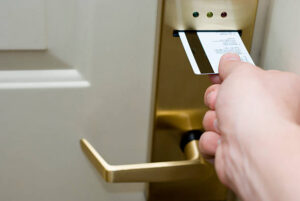Not All Locks Are Created Equal
Ever thought all locks are the same? Think again. Let’s talk about high security door locks and why they’re not your run-of-the-mill padlocks.
Imagine you’re setting up a fortress to protect your treasure. Would you use a flimsy wooden gate or an ironclad barrier? The answer’s obvious, right? Yet, many people treat their home security like that fragile gate, thinking any lock will do. Big mistake!
Take Sarah’s story for instance. She moved into her new apartment and installed what she thought was a sturdy lock from the local hardware store. One evening, she came back to find her place ransacked. Turns out, the so-called “sturdy” lock could be picked with a hairpin! A wake-up call if there ever was one.
High-security locks aren’t just fancy gadgets; they’re built differently—think of them as Fort Knox in your front door handle. These bad boys come with drill-resistant plates and hardened steel bolts that laugh in the face of intruders.

But let’s break it down further:
1. Lock Grades Matter: Just like school grades tell you how well someone did on a test, lock grades reveal their strength and durability.
– Grade 1: Top-tier stuff – can withstand heavy-duty attacks.
– Grade 2: Middle ground – decent but not invincible.
– Grade 3: Basic protection – better than nothing but don’t expect miracles.
Why settle for less when grade 1 exists?
2. Key Control Systems: Ever lost your keys at some point? Scary thought if anyone could make copies willy-nilly! High-security systems often include patented keyways which means only authorized dealers can duplicate them—peace of mind served on a silver platter.
3. Pick Resistance: Remember those spy movies where someone picks open doors in seconds flat? That might work on regular locks but high-security ones have complex mechanisms making such feats nearly impossible unless you’ve got Houdini-level skills.
4. Drill Protection: Regular locks fall apart faster than cheap furniture under drilling attempts by burglars who think they’re cleverer than they really are (spoiler alert—they’re not). High-security models feature anti-drill components ensuring even power tools won’t breach them easily.
Now let’s get real here; price tags vary significantly between standard vs high-end options—but isn’t peace worth every penny spent?
Absolutely, investing in high-security locks is like buying insurance for your peace of mind. Sure, they might cost a bit more upfront, but consider the alternative: losing priceless possessions or worse—your sense of safety.
Picture this: John down the street went cheap on his locks and ended up paying tenfold in stolen goods and repairs after a break-in. Meanwhile, Emma next door opted for top-notch security and sleeps soundly every night knowing her home is practically Fort Knox.
Let’s not forget smart features either! Some high-security locks come with digital enhancements—keypads, biometric scanners—you name it. They’re like James Bond gadgets but without the secret agent price tag.
So next time you think all locks are created equal, remember Sarah’s hairpin incident or John’s regretful penny-pinching. Invest wisely; because when it comes to protecting what matters most, cutting corners isn’t an option worth considering.
Myth: High-Security Locks are Unbreakable – The Reality
Ever felt that rush of relief when you lock your door with one of those high security door locks? It’s like a magical force field, right? Well, hate to burst your bubble, but even the most sophisticated locks aren’t invincible. They’re more like a sturdy gate than an impenetrable fortress.
Picture this: you’re watching an action movie where the hero effortlessly picks a high-tech lock in seconds. Seems far-fetched? Not entirely. Skilled locksmiths and determined burglars can crack open these “unbreakable” locks too. Sure, it takes expertise and patience—qualities not everyone possesses—but it’s possible.
High-security locks are designed to deter amateurs and delay professionals. Think of them as speed bumps rather than brick walls for thieves. If someone really wants in, they’ll find a way—be it through picking, bumping or brute force attacks.
Now let’s talk about lock-picking tools readily available online. Yes, you heard me right! You don’t need some underground black market connection; just Google it! And there you go—a whole arsenal at your fingertips for less than what you’d spend on dinner and drinks.
Speaking of tools… ever tried using bump keys? These little devils can make short work of many so-called secure locks. Slide ’em in, give ’em a tap (or bump), and voila—the door’s open faster than you can say “security breach.”
And then there’s drilling—a bit noisy but highly effective method employed by pros who don’t mind making some racket if they know no one’s around to hear them anyway.
So why do we invest heavily in these high-security options knowing they’re not foolproof? Peace of mind plays its part here; after all nobody wants their home feeling like Fort Knox unless absolutely necessary!
Here’s another kicker: sometimes simplicity beats complexity hands down! A basic deadbolt paired with good ol’ common sense often trumps fancy gadgets any day! Remember leaving lights on while away or having trustworthy neighbors keep watch?
Sure, a high-tech lock might slow down an intruder, but if your windows are wide open or you’ve left the spare key under the doormat (classic move), then all bets are off. It’s like putting a padlock on a paper bag—kind of pointless.
Now, don’t get me wrong. High-security locks have their place and purpose. They’re great for adding that extra layer of protection, especially in areas with higher crime rates or for securing valuable items. But they shouldn’t be your only line of defense.
Think about it this way: even the most fortified castle had multiple layers of security—moats, drawbridges, archers on the walls. Your home should be no different! Invest in good lighting around entry points; consider installing cameras and alarms too.
Let’s not forget about regular maintenance either! A well-maintained lock is far more effective than one that’s rusty and barely holding together. Lubricate those mechanisms regularly and check for wear and tear.
And here’s something else to chew on: social engineering can sometimes bypass any physical barrier altogether! Imagine someone posing as a delivery person or utility worker gaining access because they seemed legit? Always verify before letting anyone inside!
So next time you’re shopping for high-security door locks remember—they’re just part of an overall strategy rather than standalone solutions against break-ins!






